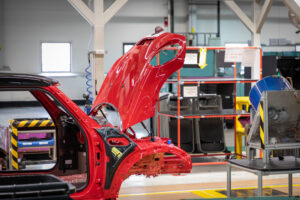
The German automotive giant BMW is in talks with the government about a £75m funding package that would secure production of electric Minis at its Oxfordshire plant.
Its is understood BMW is negotiating with officials at the Department for Business, Energy and Industrial Strategy (BEIS) over a grant from Whitehall’s Automotive Transformation Fund.
Industry sources said a deal could be finalised between the government and the company within weeks.
One added that the package, which would be worth up to £75m, appeared to have support from both Grant Shapps, the business secretary, and Jeremy Hunt, the chancellor.
It is unclear when the funding would be released and when the plant would begin utilising it.
If a deal is finalised, it would provide a boost to the British car industry weeks after it emerged that the sector had had its worst year in production terms since the 1950s.
In 2022, carmakers produced just 775,000 vehicles, a slump of nearly 10%, according to the Society of Motor Manufacturers and Traders (SMMT).
Supply chain issues such as component bottlenecks were a major factor in the decline, but the gloom enveloping the industry has been deepened by the recent collapse of Britishvolt, the fledgling electric vehicle battery manufacturer.
The Financial Times reported on Friday that Recharge Industries, an Australian company, had been chosen by administrators as Britishvolt’s preferred bidder.
Production of the Mini at Cowley dates back to the 1950s, and resumed under BMW’s ownership in the early 2000s.
Roughly 200,000 Minis are built at Oxford each year, with about 80% destined for export markets.
The plant employs about 4,000, making it easily one of the most significant in Britain.
Nissan and Ford have both announced new investments in their UK facilities in the last year, with the latter saying in December that it would spend £150m at its Halewood plant in Liverpool to expand production of electric vehicle parts.
BMW announced in 2021 that it would cease making the electric Mini in Oxford, adding last October that the UK plant would instead build the Mini Cooper three-door and five-door hatch models.
“Additionally the Mini Convertible will be returning to Oxford from 2025 – this is one of our most important cars and a global best-seller,” it said at the time.
“Electric MINIs – a hatchback and small SUV – will start their production in China through our partnership with Great Wall and the electric Countryman will be built in Leipzig [in Germany].
“Beyond this we cannot go at this point.
“Future production plans will be announced in due course.
“Oxford plays an important role in the BMW Group’s production strategy, with its high degree of flexibility, competitiveness and expertise and will remain at the heart of Mini production.”
A BMW spokesman declined to comment this weekend on its funding talks with the government.
A BEIS spokesperson said: “The UK is one of the best locations in the world for automotive manufacturing.
“Investment through the Automotive Transformation Fund will develop a high-value end-to-end electrified automotive supply chain in the UK, and this includes unlocking private investment in gigafactories.
“We’re also working with industry through the Automotive Council’s Skills Working Group to ensure the UK automotive industry can support and develop the skills needed for sustainable success.”
Read more:
BMW in negotiations for £75M from government to retain electric Mini production in Oxford

